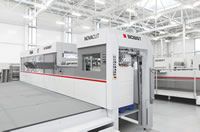‘The East African region shows particularly promising growth with GDP is on the up and the job market improving. And, with a fast-growing population, market development is a given,’ he adds. ‘With 130 Sidel machines already in operation, and 40 complete lines, we’re fully committed to our local partners. Investing in expansion is an ongoing process and several exciting projects are underway.’
But, of course, he recognises that the region has challenges – investors are difficult to secure and economies can be unstable. Additionally, raw material and manufacturing costs can be high, and the transfer of knowledge fragmented.
‘However, Dominique continues, ‘there are benefits. East Africa’s banking system is among the more sophisticated on the continent and the workforce is educated. In terms of the packaging market, converters are embracing global trends and realising the benefit of having access to Sidel’s local support and comprehensive global resources.’
In 2013, Sidel was restructured into six global zones – including the Greater Middle East & Africa (GMEA) zone with headquarters in Dubai, UAE, and supporting offices in Johannesburg. The GMEA team includes 250 employees experienced in all relevant management fields.
‘We now have 50 field service engineers based in Africa, specifically South Africa, Kenya, Nigeria, Ivory Coast and Angola, providing 24-hour after-sales and installation support,’ adds Dominique. ‘Our African customers know they’re getting the highest quality technologies and expert advice.’
Taking innovation to market
In the East African beverage sector, statistics reveal a definite movement from traditional glass packaging to PET and cans, with PET recognised as the most convenient material in terms of distribution.
Given the limited access to safe drinking water in some regions of Kenya, bottled water sales remain buoyant. In 2014 alone, consumption reached 292-million litres. Carbonated soft drinks accounted for 270-million litres.
Consumer needs are changing and East African brand owners want bottle designs in line with global trends in terms of market appeal and functionality. There’s a positive trend towards aseptic lines and towards sustainability, with lightweighting a core design element.
Sidel innovations in PET packaging include RightWeight, a technology that ensures bottles are light, attractive, provide protection and have consumer appeal, and StarLite Base, a base design that provides durability, stability and shock and pressure resistance.
Introduced in 2013, StarLite Base is already making its mark in the global market. In September 2014, Uganda-based Hariss International received an AfriStar Award in recognition of its Riham-branded bottle, developed with Sidel’s Modumould technology, and most recently, Coca-Cola utilised StarLite Base for its special edition 100-year anniversary PET bottle.
‘We’ve always been committed to sharing our know-how with our partners in an effort to add significant value,’ Dominique sums up. ‘And, with our recently-formed GMEA we’re providing our African partners with access to ground-breaking global developments with the added support of a round-the-clock local team. Creating the right packaging and value is what it’s all about.’









